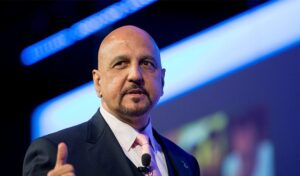Many people think that the healthcare system is broken because hospitals & insurance companies charge too much. The fact is, the market has seen a massive shift in financial responsibility for healthcare costs to the consumer. Combined with increased compliance burdens, the result is a massive spike in consumer out-of-pocket medical expenses. These expenses accumulate in the forms of deductibles, co-pays, and co-insurance, all of which the patients are not susceptible to paying. This year, patient out-of-pocket medical expenses are expected to exceed $400 billion, with a national default rate of 81%. This realization has created a crisis for both consumers and healthcare providers.
Wolfington elaborates, “I’ve been CEO of several payment companies over the last 30 years in different markets, so I learned to be a student of how consumers think. When I learned that health care had an 81% default rate on patient financial responsibility, I knew something was broken. The simple fact is, the rise in consumer health care costs has grown much faster than the education and payment options required for patients to be able to understand and afford these increased costs.”
Consumerism in healthcare is here and it is not only about us shopping for our care. The current practice for most providers is to deliver care, then casually send a bill 30-60 days later with hopes that they will get paid. To continue this trend will cause many health systems to become insolvent. This reality makes the costs of healthcare higher for everyone involved. The future for healthcare must include equal emphasis on the patients’ financial health and physical health. Best practices should include a pre-care patient engagement strategy based on offering education, transparency, and affordable payment options. Now that healthcare is the 4th largest household expense, the industry needs to replace the current dysfunction, chaos, and confusion with clarity. Through this clarity, patients can become comfortable with understanding their obligations, thus granting confidence with the access to payment alternatives they can afford. Most importantly, a pre-care engagement strategy ensures that a patients’ last point of contact with their healthcare provider is a clinical one, not financial.
Wolfington explains his stance on the state of healthcare: “Since Finpay was started in 2015, we’ve experienced triple-digit revenue growth every year. Our core principles continue to fuel our growth. I’m a faith-driven person and in matters of business, I believe the customer should be taken care of first by building out solutions that are practical and relevant. If something is known in advance, plan for it in advance. Recognize that the human brain is a computer that has a set of beliefs; those beliefs affect their perceptions and attitudes, ultimately driving consumer behavior. If you want to change a consumer’s behavior, you need to change their belief system.”
It is common for patients to think that they are entitled to free healthcare. Many have this belief because no one has ever engaged with them about healthcare costs in an efficient way. Finpay has proven that if a conversation is conducted with patients to provide education and information prior to care, then expectations are manageable, making healthcare costs more digestible. Otherwise, patients get bills that no one has explained to them. The disconnect gives way to negative attitudes and perceptions about healthcare and insurance. The disconnect hinders people from paying their medical expenses. If we can go to the patient’s core belief system to educate them on what they owe, why they owe it, and how the amount was determined, then an engaging conversation can be had about their vital role in the healthcare ecosystem. We have built these principles into our business at Finpay, and aim to change the patient’s financial experience throughout the United States healthcare system.
“As a thought leader,” Wolfington says, “I believe that the United States can continue to be the best health care system in the world, and one that is financially stable. This stability will empower us to accept the moral responsibility of providing healthcare to those in need. One of my personal objectives is to leverage FinPay’s success to create a foundation called the Community Care Foundation. I believe that sometimes achieving great things is done one small step at a time. I have two goals for the Community Care Foundation: to engage patients in a conversation regarding their financial responsibilities for their healthcare in order to minimize the healthcare disparity in our communities and to provide financial assistance to those willing to help themselves through matched payment grants. Every great journey starts with a first step.”
Christopher Wolfington is the CEO of Finpay, LLC and C.M. Wolfington, LLC. He serves as CEO of Finpay, with proven successes as a business leader and serial entrepreneur. With over 30 years of experience in payments, healthcare, technology, and financial services, Wolfington is determined to utilize his entrepreneurial talents to positively impact these industries. Having a keen eye for opportunity, Mr. Wolfington has infused his passion, energy, and capital to manifest his visions into realities. He has lead numerous businesses within the areas of payments and financial services, including three public companies.















